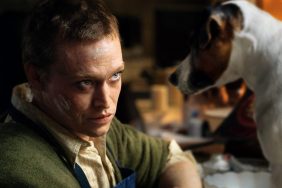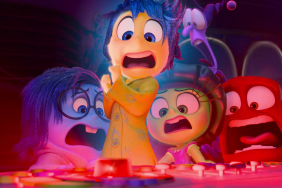
SHOCK looks at the Blu-ray release of 1973 Polish surrealist film THE HOURGLASS SANATORIUM.
Cannes Special Jury Award Winner THE HOURGLASS SANATORIUM is a journey within a jaunt perpendicular to a peregrination and overlapped with a transmigration; Wojciech Has sumptuous adaptation of the works of Polish writer Bruno Schulz results in a strongly visualized odyssey through the life and thoughts of a man, a undulating promenade of dreams and nightmares.
Beginning with motion, following a black bird flapping in the sky as we pull in through an open moving window, Józef (Jan Nowicki) travels on decrepit train to visit his ailing father Jacob (Tadeusz Kondrat) in a sanatorium. A foreboding train keeper with a candle lantern around his neck and white eyes alerts Józef of his impending stop. Upon arrival he merely walks out the train door, makes his way through a snowy graveyard, and ascends to the massive doors of the crumbling establishment. After attempting to find food in a deteriorating dining hall coated with spider webs, he is led by a nurse to his father in a bizarre room, seemingly under no care at all, with a single bed and a single lamp to illuminate him. Dr. Gotard (Gustaw Holoubek) explains the conditions of the sanatorium and his father to Józef: theyve managed to slow time down and play with it, recreating it, but there is still much left to chance.

Józef looks out a broken sanatorium window, only to see his own self arriving earlier in the day to the same door he first entered. And so begins multiple trips through time, space, and the ether of consciousness through his own life, encountering his youth, parents, relationships with women, and other events both inside and outside himself through extreme vagaries taking him from one reality through another, a truly experiential tale, an Alice in Wonderland of adulthood, sans white hare.
Jerzy Maksymiuks flute-centric score haunts the frames as Józef finds his mother in one room, the encounters a group of Jews praying as if they were in synchronized dance. Climbing a ladder he finds a redheaded nearly nude woman who hurriedly brings him into the room. He finds pages of a book, then the book itself, explaining its importance to the woman. He finds more pages under the page, and crawling underneath finds another man underneath, and a soldier in white at the foot of the bed, asking if he is Jacob, his father. He crawls toward the soldier and is then in a city square with buildings with domed tops and men in colorful bird masks about.

He finds the young boy he saw from earlier in the day at the sanatorium who shows him a stamp book he carries filled with stamps from around the world. He finds the train keeper with the lantern on a house and is led to a patch of elephants in the smoky woods. He finds a rotting butterfly, which he holds up to the sun.
Peeking through a fence, he sees a woman in all black who appears to be in mourning. He is told she is inhabited by ghosts, phantoms, larvae, and chrysalises by the womans daughter who covers the hold hes peering through with her hand. He leaves this scene and finds another broken construction, climbing down a rope ladder into a room filled with mechanized mannequins. One falls over and its mechanical guts erupt from her its face.
The film plays like a dream, or nightmare, though Józef never breaks stride, adapting to every new adventure as a condition of being alive. He doesnt flinch or pause, just moves through each new world as part of the entirety of life. The fluidity of Witold Sobocinskis cinematography (also responsible for Andrzej Zulawskis THE THIRD PART OF THE NIGHT) infuses Has adaption of Bruno Schulzs prose, whose texts Sanatorium Under the Sign of the Hourglass and Spring form the basis of this jaunt.
Schulz works are visual and based on sensation over narrative. From this following passage you can see why Has would go for a cinema of sensation over attempts at linear storytelling:

Fall is a great touring show, poetically deceptive, an enormous purple-skinned onion disclosing ever new panoramas under each of its skins. No center can be reached. Behind each wing that is moved and stored away, new and radiant scenes open up, true and alive for a moment, until you realize that they are made of cardboard. All perspectives are painted, and only the smell is authentic, the smell of wilting scenery or theatrical dressing rooms, a pile up of discarded costumes among which you wade endlessly as if through yellow fallen leaves.
By the time Józef is rejoined with his father, time has indeed elapsed, folded back on itself, and metamorphosed again, with Józef taking on a new identity, rising forth from an open grave into a field of candles, ready to begin an even newer chapter in the prolongation of his existence.
Boldly visual, exceedingly sensual, and formed from the clay of subconsciousness, THE HOURGLASS SANATORIUM is a film that plays particularly well in the dark and strange cavern of a motion picture cinema, filled with strangers both onscreen and off, though presented with eloquence on Blu-ray, its visuals and sounds are smokily intact.
Now available on Blu-ray from Mr. Bongo .









